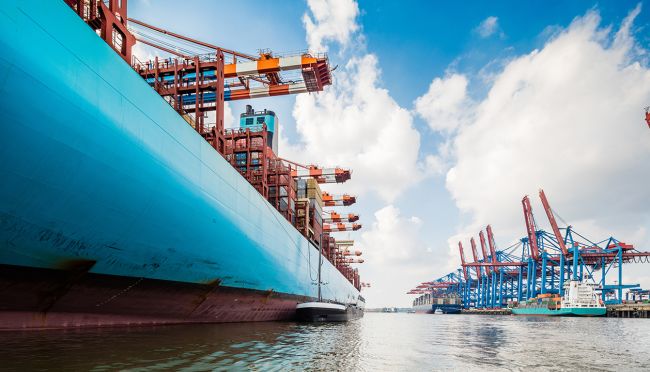Economic Growth →
→

- 02 Sep 2019
- What Do You Think?
Are Overlooked Forces Shielding the US from Severe Economic Downturns?
SUMMING UP: Many of Jame's Heskett's readers believe that one factor more than any other could kills expansion of the United States economy: actions by the Federal Reserve. Open for comment; 0 Comments.

- 22 Apr 2019
- Working Paper Summaries
Government Technology Policy, Social Value, and National Competitiveness
This study examines the impact of a French law requiring government agencies to favor open source software (OSS) over proprietary software in technology procurement processes. Results suggest a cost-effective policy lever that countries can use to both create global social value and increase their own national competitiveness.
- 01 Apr 2019
- What Do You Think?
Does Our Bias Against Federal Deficits Need Rethinking?
SUMMING UP. Readers lined up to comment on James Heskett's question on whether federal deficit spending as supported by Modern Monetary Theory is good or evil. Open for comment; 0 Comments.

- 25 Mar 2019
- Research & Ideas
The Secret Life of Supply Chains
While US policymakers and politicians focus on reviving the manufacturing sector, Mercedes Delgado and Karen Mills unearth a source of better jobs hidden in plain sight. Call it the supply chain economy. Open for comment; 0 Comments.

- 09 Jan 2019
- Research & Ideas
The UK Needs a Bold Strategy Around Competition to Survive Brexit
There is little doubt that the United Kingdom’s separation from Europe will reduce its competitiveness for the foreseeable future, argues Michael E. Porter. Here's what can be done about it. Open for comment; 0 Comments.

- 11 Dec 2018
- Research & Ideas
Free Trade Needs Nurturing—and Other Lessons from History
Global free trade is not the natural order of things, so it needs to be carefully tended to and maintained. Sophus Reinert and Dante Roscini discuss trade over time and what history teaches. Open for comment; 0 Comments.

- 07 Aug 2018
- Working Paper Summaries
Gifts of the Immigrants, Woes of the Natives: Lessons from the Age of Mass Migration
Investigating the economic and political effects of immigration across US cities between 1910 and 1930, this paper finds that political opposition to immigration can arise even when immigrants bring widespread economic benefits. The paper provides evidence that cultural differences between immigrants and natives were responsible, at least in part, for natives’ anti-immigration reactions.

- 07 Aug 2018
- Working Paper Summaries
Economic Integration and Democracy: An Empirical Investigation
Economic integration reduces or eliminates trade barriers and coordinates monetary and fiscal policies. This study suggests that demand for democracy increases with economic integration due to the presence of a learning and cultural transmission channel, so less democratic countries learn from the institutions of their (more) democratic partners.

- 25 Jun 2018
- Research & Ideas
In America, Immigrants Really Do Get the Job Done
Far from being a drain on the US economy, William Kerr’s research finds immigrants are a driver of innovation and entrepreneurship. Open for comment; 0 Comments.

- 08 Aug 2017
- Working Paper Summaries
The Role of Taxes in the Disconnect Between Corporate Performance and Economic Growth
This paper offers evidence of potential issues with the current United States system of taxation on foreign corporate profits. A reduction in the US tax rate and the move to a territorial tax system from a worldwide system could better align economic growth with growth in corporate profits by encouraging firms to invest domestically and repatriate foreign earnings.
- 02 Nov 2016
- Op-Ed
Government and Financial Tech Can Fix Cash Woes for Small Businesses
Cash flow is a major concern for small businesses, which, on average, hold only 27 days’ reserve. Karen Mills looks at how "fintech" and government policies can pull companies off the cash flow edge. Open for comment; 0 Comments.
- 05 Oct 2016
- What Do You Think?
Can the US Economy Regain the Growth and Prosperity of the Past?
SUMMING UP: To recapture the powerful economic growth rates of the past, the United States must reinvigorate its middle class. James Heskett's readers debate how this can be done. Open for comment; 0 Comments.
- 29 Jul 2013
- Research & Ideas
A Manager’s Moral Obligation to Preserve Capitalism
Harvard Business School's Rebecca M. Henderson and Karthik Ramanna argue that company managers have a moral obligation to preserve capitalism. Closed for comment; 0 Comments.
- 30 Jul 2012
- Research & Ideas
How Technology Adoption Affects Global Economies
In a series of research papers, Associate Professor Diego A. Comin and colleagues investigated the relationship between technology adoption and per capita income. They found that the rate at which nations adopted new tools hundreds of years ago strongly affects whether those nations are rich or poor today. Closed for comment; 0 Comments.

- 11 Sep 2009
- Working Paper Summaries
Financing Constraints and Entrepreneurship
Financing constraints are one of the biggest concerns impacting potential entrepreneurs around the world. Given the important role that entrepreneurship is believed to play in the process of economic growth, alleviating financing constraints for would-be entrepreneurs is also an important goal for policymakers worldwide. In this paper HBS professors William R. Kerr and Ramana Nanda review two major streams of research examining the relevance of financing constraints for entrepreneurship. They then introduce a framework that provides a unified perspective on these research streams, thereby highlighting some important areas for future research and policy analysis in entrepreneurial finance. Key concepts include: Promoting entrepreneurship is an important goal of many governments, and researchers need to define for policymakers a more unified perspective for how studies and samples fit together. The "slice" of entrepreneurship examined is very important for the appropriate positioning of research on financing constraints, but studies too often fail to consider this dimension in the conclusions drawn from empirical results. The framework presented here is useful for thinking about the appropriate role of public policy in stimulating entrepreneurship. Closed for comment; 0 Comments.
- 18 May 2009
- Research & Ideas
The Unseen Link Between Savings and National Growth
Professor Diego Comin and fellow researchers find a little observed link between private savings and country growth. The work may offer a simple interpretation for the East Asia "miracle" and for failures in Latin America. Q&A. Key concepts include: Companies in poor countries must attract FDI to gain access to "frontier technologies" that drive productivity and growth. Savings become key to attracting these investors, who expect the local company to have colateral in the deal. A 10 percent increase in the savings rate over the previous 10 years leads to an increase in the average growth rate over the next 10 years of 1.3 percent. Developing countries should consider policies that foster domestic savings. Closed for comment; 0 Comments.

- 20 Feb 2009
- Working Paper Summaries
When Does Domestic Saving Matter for Economic Growth?
The researchers begin with a simply stated question: Can a country grow faster by saving more? Long-run growth theories imply that a country can grow faster by investing more in human or physical capital or in R&D, but that a country with access to international capital markets cannot grow faster by saving more. Domestic saving is therefore not considered an important ingredient in the growth process because investment can be financed by foreign saving. From the point of view of standard growth theory, the positive cross-country correlation between saving and growth that many commentators have noted appears puzzling. HBS professor Diego Comin and colleagues develop a theory of local saving and growth in an open economy with domestic and foreign investors. Key concepts include: Domestic saving is more critical for adopting new technologies in developing rather than developed economies. Familiarity with the technology frontier reduces its cost of adoption. Advanced countries readily adopt the frontier technology, but for countries far from the technology frontier, it is too expensive to adopt such technology without outside help. Entrepreneurs in these countries need to rely on foreign investors. However, domestic entrepreneurs may not deliver on their input contribution unless they have invested sufficient capital in the project. This co-investment is in turn financed out of domestic saving, highlighting the role of domestic saving in economic growth. Closed for comment; 0 Comments.
- 28 Jul 2003
- Research & Ideas
It’s India Above China in New World Order
Can India overtake China? That's the title of an influential new article in Foreign Policy magazine. A Q&A with authors Yasheng Huang of MIT and Tarun Khanna of HBS. Closed for comment; 0 Comments.

Corporate Innovation Increasingly Benefits from Government Research
Nearly a third of US patents rely directly on government-funded research, says Dennis Yao. Is government too involved in supporting private sector innovation—or not enough? Open for comment; 0 Comments.